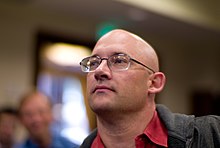 Clay Shirky is a writer, consultant on, and
teacher on the social and economic effects of Internet technologies. He
currently holds a joint appointment at New York University as Arts Professor at
NYU’s Interactive Telecommunications Program in the Tisch School of the Arts,
and as a Distinguished Writer in Residence at the Arthur L. Carter Journalism
Institute. Shirky is also a Fellow in the
Berkman Center for Internet & Society at Harvard University, and he worked
as the Edward R. Murrow Visiting Lecturer at the Shorenstein Center for the
Press and Public Policy at the Kennedy School of Government, Harvard University,
in the fall of 2010.
Clay Shirky is a writer, consultant on, and
teacher on the social and economic effects of Internet technologies. He
currently holds a joint appointment at New York University as Arts Professor at
NYU’s Interactive Telecommunications Program in the Tisch School of the Arts,
and as a Distinguished Writer in Residence at the Arthur L. Carter Journalism
Institute. Shirky is also a Fellow in the
Berkman Center for Internet & Society at Harvard University, and he worked
as the Edward R. Murrow Visiting Lecturer at the Shorenstein Center for the
Press and Public Policy at the Kennedy School of Government, Harvard University,
in the fall of 2010.
After received his Bachelor of Arts degree
in fine art at Yale University in 1986, Shirky founded a theatre company, and
worked as a lighting designer for other theaters/dance companies in the 1990s. During
the same time, Shirky was the vice-president of the New York chapter of the
Electronic Frontier Foundation (EFF),
a non-profit organization defending free speech, privacy, and consumer rights
during the digital age.
In his book Here Comes Everybody: The Power of Organizing Without Organizations,
published by Penguin in 2008, he discussed the social and economic impact of
collaborative actions brought by the Internet technologies, such as the social
networking tools. Shirky introduces the concept of “mass amateurization”, which,
based on Shirky’ statement, is the future for the media professionals.
In 2010, Shirky published another book, Cognitive Surplus: Creativity and Generosityin a Connected Age. Similar to his previous book, Shirky investigates
how the Internet technologies are changing us from consumers to producers/collaborators.
Further, Shirky introduces a new concept in the second book: cognitive surplus,
which can be defined as “the time freed from watching television which can be
enormously productive when applied to other social endeavors.”
Moreover, Shirky is a frequent speaker in
TED. Here you can find all his TED talks, and the “How social media can make history” is related to our reading in this week. Also, Shirky is an active blogger, and
you can read his most recent writings at his blog. You
can also find his CVs at different locations: Wikipedia,ITP at NYU,
and Journalism Institute at NYU.
No comments:
Post a Comment
Note: Only a member of this blog may post a comment.